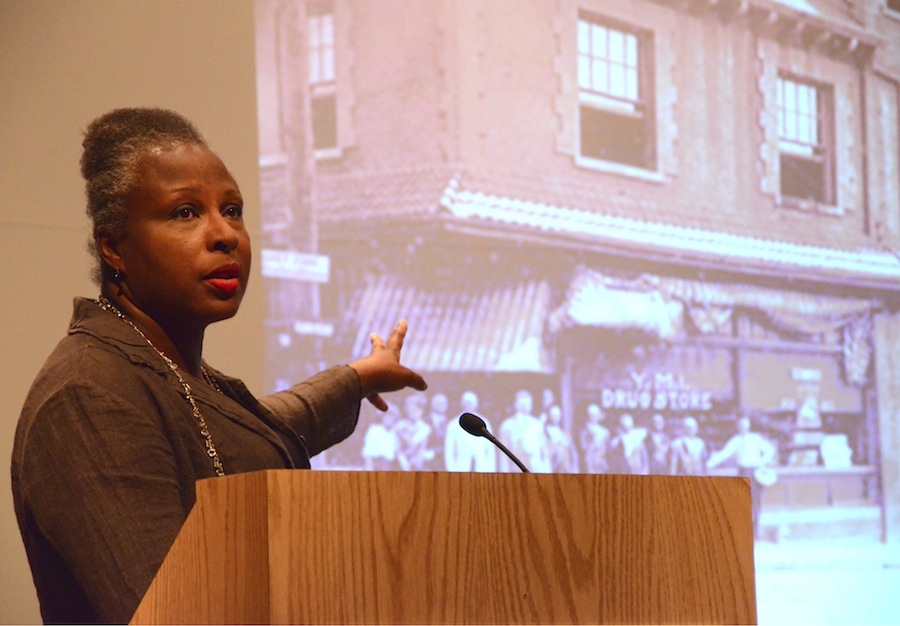Two days after being admitted for treatment at Mission Hospital, the 55-year-old patient told his nurse he wanted to leave.
He didn’t like being there. He felt uncomfortable. He even said he felt fearful. But, he explained to the nurse, he did not want to leave due to the quality of care he received. The African American man wanted to leave because he didn’t see anyone that looked like him except for the janitors.
“It left me feeling uncomfortable. I didn’t know how to answer his observations that were absolutely correct,” a doctor tells an auditorium of about 50 people, made up of mostly white medical professionals.
“Unfortunately, that is very common,” Sharon West replies. The Women Veterans Program Manager had just given a 30-minute presentation to members of the local health care community. Beginning in 1890 and winding toward 1960, her presentation explored medical accessibility and access for African Americans in Buncombe County. However, as West responds to the doctor’s present concerns, she reveals that, in many ways, Buncombe still has a ways to go when it comes to diversity in the medical community.
Referencing data from the Western Carolina Medical Society and the U.S. Census, the registered nurse says, “Currently in Buncombe County, there’s 974 physicians actively practicing medicine, and still, eight are African Americans. That’s less than 1 percent. That’s not good.”
Though she has given this presentation multiple times, West stresses that the past can explain the present and potentially save the future.
“The historic context shapes the contemporary structure. What we did then, has a tendency to shape what we’re doing now if we don’t change something,” she states.
For West, her curiosity for information about the local African American population’s access to medical care began when her grandmother mentioned the existence of a place called the Asheville Colored Hospital. In 1941, Dr. Mary Frances Shuford opened a clinic in an eight-room house on College Street. The following year, the clinic became Asheville Colored Hospital, and boasted a board of directors comprised of both blacks and whites.
But once West began her research 13 years ago, she found more than she expected through talking to elders in the community, listening to oral histories, pulling documents and interviewing people.
“In the end, I knew it was finished because when I looked back over it and all of it put together, I shed so many tears,” she says.
For example, in 1940 there were 400 hospital beds available for Buncombe County citizens, but only 18 beds were designated for blacks. Compare these numbers to the U.S. Census data at the time that show Buncombe County’s population at about 52,000 people, of which 15,000 were African American.
“Those were not beds just for the black people. These were beds for low-income populations. So if there was a low-income white person that needed that bed more so than the black person, then that white person would occupy that bed,” West says. “That equates to one bed for every 800 black citizens in Buncombe County.”
Though Jacquelyn Hallum, who serves as the Director of Health Careers and Diversity for the Mountain Area Health Education Center, had heard the presentation before, she says it bears repeating for providers who serve members of the black population.
“It just creates a heightened level of awareness to know sometimes where you’ve come from because sometimes if you just walk into a room, you assume that’s the way the room has always been set up,” she says.
For Brianna Rock, who went through Western Carolina Medical Society’s minority medical mentoring program, she says this was the first time she had heard this history.
“I would have never learned this if I didn’t come to this presentation. They don’t talk about this in school or anything. I’s a part of the history of Asheville that, when I do come back to serve as a physician or surgeon, it would be helpful to know,” the Berea College sophomore shares.
Going forward, West emphasizes that the future of cultural representation in medicine starts at with education. She urges doctors to go beyond the hospital walls and find ways to encourage minorities to seek a future in medicine at all levels.
As she makes her way to her last slide, West turns her speech back to the present.
“This is a time when we must work together and we must be sensitive to the needs of other communities,” she says. “Even though the community that we spoke about today is one segment of the community, you know what? It affects the entire community.”
Caitlin Byrd can be reached at cbyrd@mountainx.com, or 251-1333, ext. 140.




Before you comment
The comments section is here to provide a platform for civil dialogue on the issues we face together as a local community. Xpress is committed to offering this platform for all voices, but when the tone of the discussion gets nasty or strays off topic, we believe many people choose not to participate. Xpress editors are determined to moderate comments to ensure a constructive interchange is maintained. All comments judged not to be in keeping with the spirit of civil discourse will be removed and repeat violators will be banned. See here for our terms of service. Thank you for being part of this effort to promote respectful discussion.